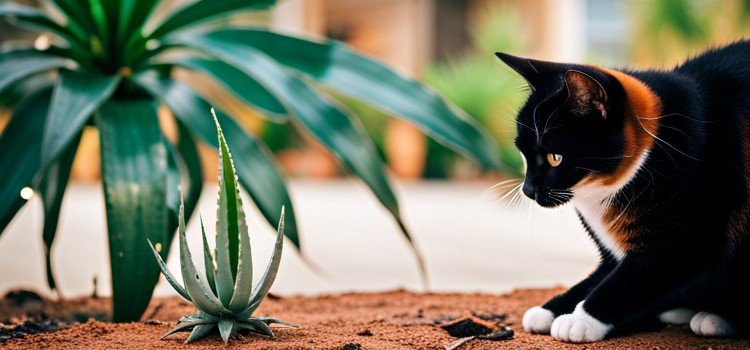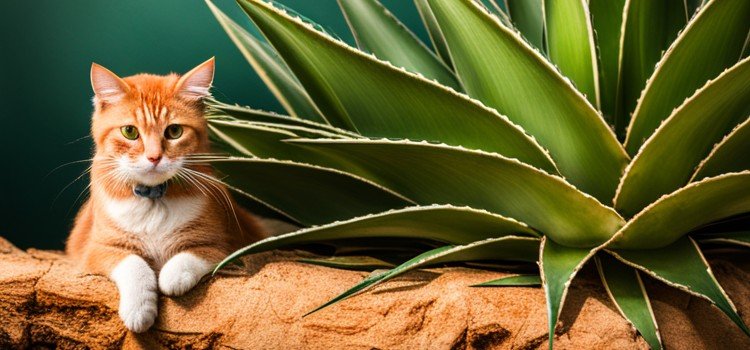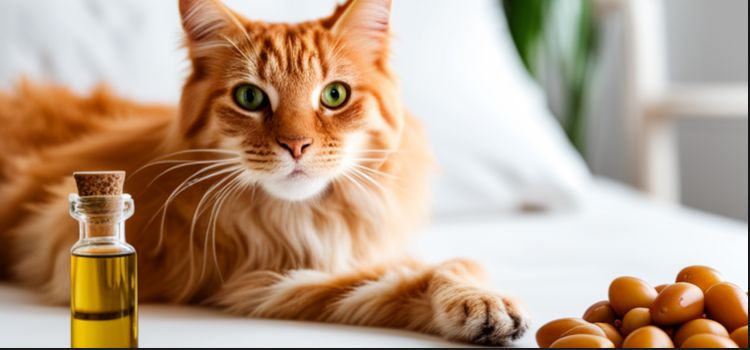As an Amazon Associate committed to the mission of improving the lives of our readers, Live-Clear.com receives a small commission from eligible purchases made through our affiliate links. This revenue enables us to keep producing insightful articles and other material.
Cats are curious creatures known for their inquisitive nature and occasional nibbling on plants. As a responsible pet owner, it’s essential to know what your feline friend is exposed to, including the plants in and around your home. Agave, a popular succulent plant, has gained widespread attention for its unique appearance and easy maintenance. But is agave toxic to cats? In this comprehensive guide, we’ll explore the potential dangers of agave for your feline companion.

Agave: An Overview
Agave is a type of succulent plant that comes in various species, with some popular ones being the Agave americana (Century Plant) and Agave parryi. These plants are prized for their striking rosette shape and attractive, spiky leaves. They are often used as ornamental plants both indoors and outdoors due to their hardiness and low maintenance requirements.
Toxic Compounds in Agave
While agave is generally considered safe for humans, it can pose a significant risk to cats. The primary toxic compounds in agave are saponins and oxalates:
- Saponins: Agave plants contain compounds known as saponins, natural detergents. Ingesting saponins can lead to gastrointestinal upset, including vomiting and diarrhea.
- Oxalates: Oxalates are tiny crystals found in some plants, including agave. When ingested, oxalates can cause irritation and swelling in the mouth and throat, leading to drooling, difficulty swallowing, and potentially severe respiratory distress.
Signs of Agave Toxicity in Cats
If your cat has ingested agave or come into contact with it, you may notice several signs of toxicity, including:
- Vomiting
- Diarrhea
- Excessive drooling
- Pawing at the mouth
- Difficulty swallowing
- Swelling of the mouth, lips, or tongue
- Lethargy
- Difficulty breathing (in severe cases)
It’s important to note that the severity of symptoms can vary depending on the cat’s size, the amount of agave ingested, and the specific species of agave. In severe cases, agave toxicity can be life-threatening and may require immediate veterinary attention.
Treatment for Agave Toxicity
If you suspect your cat has ingested agave or is showing signs of agave toxicity, it’s crucial to seek prompt veterinary care. Treatment may include:
- Inducing vomiting: Sometimes, the vet may induce vomiting to remove any remaining agave from your cat’s stomach.
- Activated charcoal: This can be administered to absorb any remaining toxins in the gastrointestinal tract.
- Fluid therapy: Intravenous fluids may be given to prevent dehydration and flush out toxins.
- Medications: Depending on the symptoms, your vet may prescribe medications to address inflammation, pain, or difficulty breathing.
- Monitoring: Your cat may need to be closely monitored, especially if they’ve ingested a large amount of agave.
Preventing Agave Toxicity
Preventing agave toxicity in cats is essential for their well-being. Here are some steps you can take to keep your feline friend safe:
Remove Agave from Your Home
The most effective way to prevent agave toxicity is to avoid having agave plants in your home or garden. Opt for non-toxic plants to add greenery to your living space. If you do have agave plants in your home or garden, make sure they are placed in areas that are inaccessible to your cat. Consider using barriers or elevated plant stands to keep them out of reach. Additionally, always supervise your cats outdoors to prevent them from coming into contact with agave plants in the neighborhood.
Supervision
If you have agave plants, ensure your cat’s access to them is restricted. You can place the plants out of their reach or use barriers to keep them away. Furthermore, it is essential to regularly inspect your home or garden for any fallen agave leaves or plant parts, as these can still pose a danger to your cat even if the plant itself is inaccessible. Additionally, familiarize yourself with the signs and symptoms of agave poisoning in cats, such as vomiting, diarrhea, and lethargy, so you can seek immediate veterinary attention if necessary.
Educate Yourself
Learn about toxic plants and everyday household items that can harm your cat. Awareness is critical to preventing accidents. Take the time to research and identify common toxic plants that may be present in your home or garden, such as lilies, azaleas, and philodendrons. It’s also important to be aware of household items that can harm cats, such as certain cleaning products, medications, and foods like chocolate or onions. By educating yourself on these potential dangers, you can take proactive measures to keep your cat safe and avoid any potential accidents.
Provide Safe Alternatives
Cats often chew on plants as a natural behavior. To satisfy this instinct, consider offering safe, non-toxic alternatives like cat grass. Cat grass is an excellent option as it provides the same satisfaction for your cat’s chewing needs without posing any harm. Additionally, you can also provide interactive toys or puzzle feeders to keep your cat mentally stimulated and distract them from chewing on plants or other potentially dangerous items.
Regular Vet Check-ups
Routine vet visits can help detect any potential health issues early and provide guidance on keeping your cat safe. Regular vet check-ups are essential for maintaining your cat’s overall well-being. During these visits, the vet can perform thorough examinations, administer necessary vaccinations, and discuss any concerns or questions you may have regarding your cat’s safety. By staying proactive with regular check-ups, you can ensure that your cat receives the best possible care and minimize the risk of any potential health issues going unnoticed.

Conclusion
In conclusion, while agave plants are attractive and famous for their unique appearance, they pose a significant risk to cats due to toxic compounds like saponins and oxalates. To keep your feline friend safe, it’s best to avoid having agave plants in your home or garden and opt for non-toxic alternatives. If you suspect agave ingestion or notice signs of toxicity, consult your veterinarian immediately. Your cat’s health and safety should always be a top priority, and prevention is the key to a happy and healthy life for your furry companion.
Frequently Asked Questions (FAQs)
Yes, if you don’t have a cat, agave plants can be a beautiful addition to your home or garden without concerns about feline toxicity. However, always exercise caution if you plan to introduce a cat to the environment later.
While it’s possible to grow agave plants indoors, it’s challenging to eliminate all risks to your cat. It’s best to choose non-toxic houseplants if you have feline companions.
If you suspect your cat has ingested agave or is showing signs of agave toxicity, contact your veterinarian immediately. Time is crucial when dealing with potential plant toxicity.
Yes, several non-toxic plants are safe for cats, including cat grass, spider plants, and Boston ferns. These can provide a cat-friendly alternative to satisfy their natural plant-chewing instincts.
The long-term effects can vary depending on the severity of exposure and the treatment provided. Sometimes, there may be lasting damage, particularly if treatment is delayed. Regular follow-up with your vet is essential for monitoring your cat’s recovery.
Agave may be aesthetically pleasing, but it can pose a significant threat to your beloved feline companion. By being aware of the potential dangers of agave and taking proactive steps to prevent exposure, you can help keep your cat safe and healthy. Remember that if you suspect your cat has ingested agave or is showing signs of toxicity, it’s crucial to seek immediate veterinary care. Your cat’s well-being should always be the top priority.
Amazon and the Amazon logo are trademarks of Amazon.com, Inc, or its affiliates.



